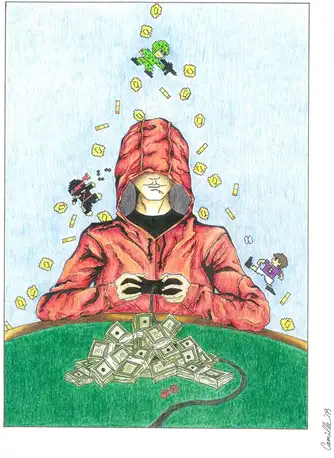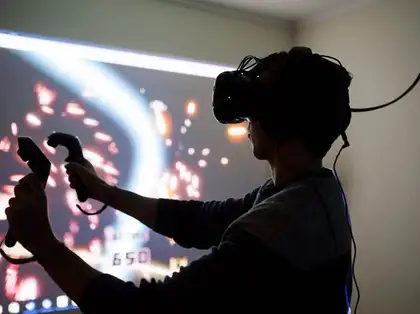Global policy change
Dr Drummond has given oral or written testimony at five international inquiries and hearings.
150+ news stories
Media worldwide covered Dr Drummond's loot box findings.
8 published papers
This includes two in the esteemed cognitive psychological journal 'Nature Human Behaviour'.
12+ community partnerships
Dr Drummond works with mental health and addiction services and classification authorities, raising awareness of potential harm.
It started with Star Wars and has led to law reviews in Aotearoa New Zealand, Australia, the United States, China and Europe.
Dr Aaron Drummond's research into the psychological and legal similarities between chance-based video game rewards and gambling gave policy makers the evidence needed to inspire consumer law change that protects vulnerable gamers.
Concern over paid chance rewards
The gaming community first raised the issue. When, in 2017, a video game came on the market — described by Hawaiian politician Chris Lee as a “Star Wars themed casino” — they expressed their annoyance in gaming forums and chat rooms.
The controversy centred on a concept called loot boxes. These give players the chance to win a virtual reward in exchange for real money. Loot boxes have been used in video games since around 2010. But in 2016 and 2017, Dr Drummond says, the use of this device exploded.
"We saw loot box inclusion in games pretty much double over a two-year period."
Gamers were irked at being asked to pay for features beyond the price of the game. Mr Lee and others were concerned about the potential for harm.
Loot boxes
These are virtual boxes containing random items you can use in a video game. Some items are cosmetic – like a new look, or character outfit. Others give players a game advantage – like a more powerful weapon. Most games offer ways to earn rewards. But the key to a loot box is the boxed item is random. Often, you have to use real money to unlock the unknown reward.
Adding science to the debate

A long-time gamer himself, Dr Drummond, Senior Lecturer in Massey's School of Psychology, saw the chance to combine his hobby and psychological and academic expertise. With friend, peer and fellow gamer, Dr James Sauer from the University of Tasmania, he started gathering facts.
“When the gaming community became interested in whether or not this was a gambling issue, we also became interested."
Assessing loot boxes against gambling criteria
Dr Drummond and Dr Sauer looked at 22 video games with loot boxes released on the major consoles in 2016 and 2017. They evaluated these against Professor Mark Griffith's 1995 psychological criteria for distinguishing gambling from other risk-taking activities.
Professor Griffith's criteria are:
- exchange of money or valuable goods
- unknown future event determines the exchange
- chance at least partly determines the outcome
- non-participation can avoid incurring losses
- winners gain at the sole expense of losers.
Dr Drummond says assessing criteria one to four was self-evident. Criterion five — "winners gain at the sole expense of losers" — was more nuanced. To assess this, the researchers looked at competitive advantage in the game.
If the loot box allowed some users a competitive edge over other players in future games, Dr Drummond and Dr Sauer considered the criterion satisfied. If loot boxes only contained cosmetic rewards, for example a new outfit or accessory, the loot box set up did not satisfy this criterion.
"All of the games we reviewed in our analysis are available to people under the age of 18. Many of them are available to players under the age of 13."
Psychological and legal definitions met
Dr Drummond says they approached the issue with a degree of scepticism, since claims about video games are quite often overblown. But the researchers were surprised to find almost half the loot boxes they examined met the psychological criteria for gambling.
In many cases, loot boxes also met the legal definition. This describes gambling as an event with an uncertain outcome with the intent of winning something else of value. One in five rewards could be exchanged on third-party sites for money, some for more than NZD$1,000.
Dr Drummond and Dr Sauer also point out value is not limited to loot boxes being able to be exchanged for real money.
A complementary study by Dr David Zendle shows little difference in people's behaviour, whether loot box rewards are for money or virtual gain — a competitive advantage can be just as alluring as hard cash. This study also shows problem gamblers spend significantly more on loot boxes (USD$25 a month) than those with no such symptoms (USD$2.50 a month).
Dr Drummond and Dr Sauer's paper from their first round of loot box research
Why loot boxes may leave some gamers wanting more
Loot boxes and gambling use the psychological device of 'variable ratio reinforcement'. We're more likely to repeat behaviours we're rewarded for. When rewards are given randomly, we usually adopt a behaviour quicker.
Each time you act and don't get the reward, you feel one step closer. So you try again. You never know when you’ll get that big shiny win — keeping you engaged with the mechanisms.
International policy change
Following their discovery, Dr Drummond and Dr Sauer have given oral or written testimony at five international inquiries and hearings. These have prompted legislation change or further policy review in these countries.
The UK, for example, now requires games with loot boxes to disclose this on the games' box.
After Dr Drummond and his team published a paper suggesting consumer protection in the form of loot box purchase limits, China made the decision to restrict the number of loot boxes people are allowed to buy in one day.
Consumer labelling
The Pan European Game Information System (PEGI) – the organisation responsible for providing age ratings and content warning labels for video games in 39 countries – now requires video game publishers to label games that include the chance to buy "random items".
PEGI's decision was influenced by recommendations from the UK's Digital, Culture, Media and Sport Committee's (DCMSC) 'Loot Boxes in Video Games and Immersive and Addictive Technologies Inquiry' for which Dr Drummond and Dr Sauer co-authored a report.
The Entertainment Ratings Board, PEGI's US counterpart, has followed suit. Both organisations have also committed to educating consumers about different loot box setups.
This means consumers, including parents, can now decide if they want to buy a game containing loot boxes, instead of finding out the game sells chance-based rewards once they, or their child, is already playing.
"It’s important not to react with moral panic. It’s largely about helping people to make informed decisions. Providing accurate information to parents and consumers will allow them to make better decisions for themselves and their whānau.”

Video game publishers must now label games that include the chance to buy "random items".
Education and awareness
Dr Drummond and Dr Sauer have also shared their results and expert opinions with media internationally. Their loot box research has been covered in more than 150 news stories.
The researchers contributed to a deep dive into gaming tactics used to take people's time and money on Australian investigative news television programme Four Corners.
They also collaborate with mental and public health services to raise awareness of potential harm among health professionals, vulnerable consumers and whānau.
Organisations Dr Drummond has worked with include:
- Atareira whanau support
- Hāpai Te Hauora Māori Public Health
- Te Mana Whakaatu Classification Office
- Problem Gambling Foundation of New Zealand.
Watch video on gaming tactics used to take people's time and money
Evidence for regulation

Gaming is a fast-moving industry. Digital regulation and governance often lag behind technology and innovation, creating unregulated or under-regulated spaces. Dr Drummond and Dr Sauer's research, which shows clear links between gambling mechanics and loot boxes, has allowed gambling legislation to be re-examined, taking an evidence-based approach.
Building on the research
With funding from the Royal Society Te Apārangi Fast Start Grant, Dr Drummond and Dr Sauer are digging into the relationship between problem gambling symptoms and loot box spending.
This follow-on work combines survey-based and experimental methods, and involves postgraduate students, under Dr Drummond's supervision:
- five honours students
- one master's student
- three PhD students.
Replicating Dr Zendle's methods, the team have surveyed 1,049 people across Aotearoa New Zealand, Australia and the US. They find a similar relationship between problem gambling, excessive gaming, psychological distress and loot box spending as Dr Zendle uncovered in the UK.
This cross-cultural validation is important — it ensures loot box evidence used to influence policy decisions translates to the nation in which it is being applied.
As in many areas, the COVID-19 effect rears its head. Massey researchers noticed people isolated due to the pandemic had a stronger association between problem gambling symptoms and loot box spending.
Teaming with Dr Zendle, the researchers have notably discounted a link between problem gambling and other random content such as physical collectable card games. This shows the way we respond to the sale of chance-based items must be based on evidence specific to the product being sold.
"We’re working to better understand the links between loot boxes and problem gambling. We still don't know if loot boxes cause people to develop problem gambling symptoms. Or if people with problem gambling symptoms are just more attracted to buying loot boxes."
More information
Researchers and organisations
Researchers:
Organisations:
- Atareira whanau support
- Hāpai Te Hauora Māori Public Health
- Te Mana Whakaatu Classification Office
- Problem Gambling Foundation of New Zealand.
Academic papers
- Drummond, A., Sauer, J.D. (2018). Video game loot boxes are psychologically akin to gambling, Nature Human Behaviour 2, 530–532. https://doi.org/10.1038/s41562-018-0360-1 (login needed)
- Drummond, A., Sauer, J. D., Hall, L. C. (2019). Loot box limit-setting: a potential policy to protect video game users with gambling problems? Addiction, 114 (5), 935–936. https://doi.org/10.1111/add.14583
- Drummond, A., Sauer, J. D., Hall, L. C., et al. (2020) Why loot boxes could be regulated as gambling, Nature Human Behaviour 4, 986–988. https://doi.org/10.1038/s41562-020-0900-3 (login needed)
- Drummond A., Sauer, J. D., Ferguson, C. J., Hall L. C. (2020), The relationship between problem gambling, excessive gaming, psychological distress and spending on loot boxes in Aotearoa New Zealand, Australia, and the United States – A cross-national survey. PLoS ONE, 15(3). e0230378. https://doi.org/10.1371/journal.pone.0230378
- Garea S, Drummond A, Sauer J. D., Hall L. C., Williams M. (2021). Meta-Analysis of the Relationship between Problem Gambling, Excessive Gaming and Loot Box Purchasing. International Gambling Studies, 1–20. https://doi.org/10.1080/14459795.2021.1914705
- Hall, L. C., Drummond, A., Sauer, J. D., Ferguson, C. J. (2021). Effects of self-isolation and quarantine on loot box spending and excessive gaming –results of a natural experiment. PeerJ, 9, e10705. https://peerj.com/articles/10705/
- Zendle, D., Walasek, L. Cairns, P., Meyer, R., Drummond, A. (2021). Links between problem gambling and spending on booster packs in collectible card games: A conceptual replication of research on loot boxes. PLoS One, 16(4), e0247855. https://doi.org/10.1371/journal.pone.0247855
Policy and law reviews
New Zealand
- Dr Drummond and Dr Sauer gave written testimony about loot boxes and their potential harm to the Aotearoa New Zealand Department of Internal Affairs' Online Gambling in New Zealand Inquiry. Read DIA information about their online gambling review.
Australia
- After reading Dr Drummond and Dr Sauer's paper, Australian Greens Senator Jordan Steele-John initiated the Australian Senate Inquiry into gaming micro-transactions for chance-based items. Dr Drummond and Dr Sauer spoke as expert witnesses and gave written testimony at the inquiry.
- Based on their testimony Senator Jordan Steele-John suggested age restrictions and extra content warning labels on games containing loot boxes.
- The Australian Senate recommended additional research. Dr Drummond and Dr Sauer are one of the teams taking up this call. Read the inquiry report.
- Tasmanian MP Andrew Wilkie has also introduced a members bill to ban the sale of loot boxes to minors.
United States
- Dr Drummond provided expert Oral and Written testimony to the Illinois Consumer Protection Committee. The committee passed a Bill, requiring games containing loot boxes to carry strongly worded warning about their similarities to traditional forms of Gambling. The Bill, which is on track to pass its final reading, will affect around 12.5 million people in the State of Illinois.
- The Entertainment Software Ratings Board responsible for age ratings and content warning labels in the US now requires labelling to show when games contain chance-based paid items.
China
- Following Dr Drummond and Dr Sauer's paper recommending loot box purchase limits to protect vulnerable gamblers, China introduced restrictions on the number of loot boxes people are allowed to buy in one day. Read about the restrictions in AppInChina's guidelines on including loot boxes in games.
Europe
- Influenced by Dr Drummond and Dr Sauer's research, the Pan European Game Information System (PEGI), responsible for providing age ratings and content warning labels for video games in 39 Countries around the globe, now requires video game producers to label games that include the chance to buy “random items”.
- Dr Drummond and Dr Sauer co-authored an advisory report on loot boxes for the UK Department of Digital, Culture, Media and Sport to help being used to re-examine their policies and laws. Read about the UK government inquiry.
- Dr Drummond and Dr Sauer's work was cited by the Spanish Ministry of Consumer Affairs in their recent call for public consultation on laws around loot boxes.
Media and outreach
Guest speaker at:
- 40th Anniversary Public Lecture Series, Atareira Mental Health Support
- Annual Gambling Harm Minimisation Professional Development Workshops, Hāpai Te Hauora Māori Public Health
- International Gambling Conference 2022
Collaborated with:
- Te Mana Whakaatu Classification Office and the Problem Gambling Foundation of New Zealand to produce a guide for parents and whānau. Read the guide Understanding Loot Boxes.
Media contributions:
- Australian investigative news television programme Four Corners. Watch the Four Corners programme on gaming tactics used to take people's time and money.
- Over 150 news stories. Read coverage of Dr Drummond's research in the New Yorker.
Published 25 January 2022.
